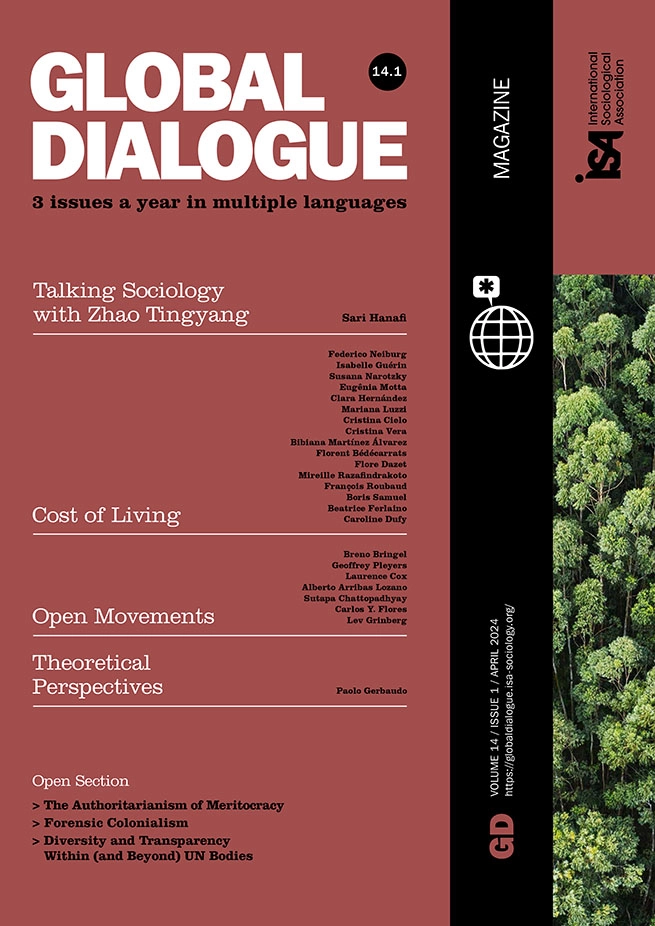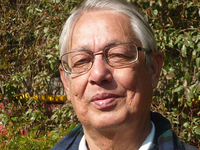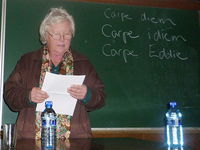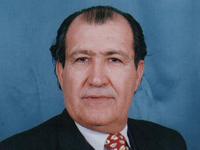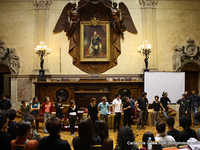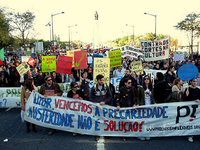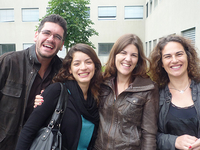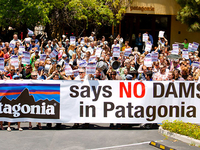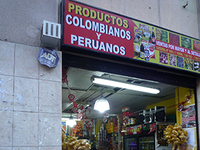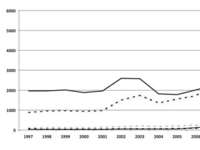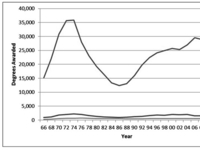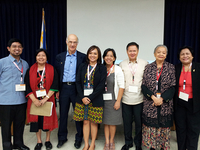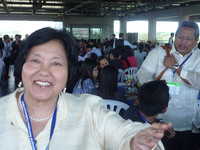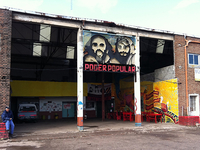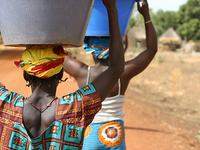GD 3.2 - February 2013
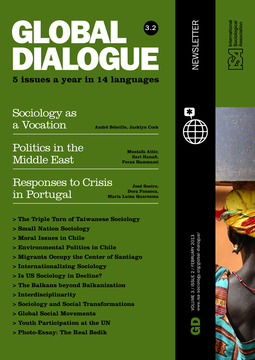
Global Dialogue is available in multiple languages!
Select the language to download the issue.
Editors:
Michael Burawoy.
Associate Editor:
Margaret Abraham, Tina Uys, Raquel Sosa, Jennifer Platt, Robert Van Krieken.
Managing Editors:
Lola Busuttil, August Bagà.
Consultants:
Abigail Andrews.
Media Consultant:
Annie Lin, José Reguera.
Consulting Editors:
Izabela Barlinska, Louis Chauvel, Dilek Cindoğlu, Tom Dwyer, Jan Fritz, Sari Hanafi , Jaime Jiménez, Habibul Khondker, Simon Mapadimeng, Ishwar Modi, Nikita Pokrovsky, Emma Porio, Yoshimichi Sato, Vineeta Sinha, Benjamín Tejerina, Chin-Chun Yi, Elena Zdravomyslova.
REGIONAL EDITORS
Arab World: Sari Hanafi , Mounir Saidani.
Brazil: Gustavo Taniguti, Juliana Tonche, Pedro Mancini, Célia da Graça Arribas, Andreza Galli, Renata Barreto Preturlan, Rossana Marinho.
Colombia: María José Álvarez Rivadulla, Sebastián Villamizar Santamaría, Andrés Castro Araújo.
India: Ishwar Modi, Rajiv Gupta, Rashmi Jain, Uday Singh.
Iran: Reyhaneh Javadi, Najmeh Taheri, Hamidreza Rafatnejad, Saghar Bozorgi, Zohreh Sorooshfar, Faezeh Khajehzadeh.
Japan: Kazuhisa Nishihara, Mari Shiba, Kousuke Himeno, Tomohiro Takami, Yutaka Iwadate, Kazuhiro Ikeda, Yu Fukuda, Michiko Sambe, Takako Sato, Shohei Ogawa, Tomoyuki Ide, Yuko Hotta, Yusuke Kosaka.
Poland: Mikołaj Mierzejewski, Karolina Mikołajewska, Jakub Rozenbaum, Krzysztof Gubański, Emilia Hudzińska, Julia Legat, Adam Müller, Tomasz Piątek, Anna Piekutowska, Anna Rzeźnik, Konrad Siemaszko, Justyna Witkowska, Zofi a Włodarczyk.
Romania: Cosima Rughinis, Ileana Cinziana Surdu.
Russia: Elena Zdravomyslova, Anna Kadnikova, Elena Nikiforova, Asja Voronkova, Ekaterina Moskaleva, Julia Martinavichene.
Taiwan: Jing-Mao Ho.
Turkey: Aytül Kasapoğlu, Nilay Çabuk Kaya, Günnur Ertong, Yonca Odabaş, Zeynep Baykal, Gizem Güner.
GD 3.2 - February 2013
Editorial
Facing an Unequal World
I write this editorial from Ramallah, the administrative center of the Palestinian Authority in the West Bank – a place of exception that opens new vistas of domination, affecting the conditions of producing sociology no less than the object of its study. If Gaza experiences the rapid and terrifying violence of bombing, then the West Bank experiences the slow violence – to follow Jackie Cock’s formulation in this issue of Global Dialogue – of geographical partitions, multiplication of checkpoints, the encroaching wall that expels Palestinians from their land, dividing them from each other, all conspiring to promote the unilateral expansion of Israeli settlements.
Life in the West Bank is defined by uncertainty and insecurity, not least in university life. But Palestinians are as resourceful in defending themselves as the Israeli state is in brutalizing them. For example, Al-Quds University, based in Abu Dis, has sponsored a unique experiment called Campus in Camps – a project to bring new critical education to the refugee camps. The brainchild of Alessandro Petti, Sandi Hilal and Munir Fasheh, fifteen young men and women from four camps have elaborated a “collective dictionary” that problematizes basic concepts of social science – citizenship, participation, well-being, sustainability, knowledge, relation, common – infusing them with local meaning. This intense process of Freirean education has brought about a transformation of the social consciousness in which the camps are no longer seen as a place of victimization but a political space that has been constituted and reconstituted since 1948.
As Feras Hammami describes in this issue of Global Dialogue, the state of exception affects the dominators too – the Israeli state suppresses dissent within its own universities. Of course, Israel is not the only example of dictatorial rule in this region. Mustafa Attir describes what it was like to conduct sociology under Gadhafi’s regime and the challenges this poses for the new order. Moving further afield, Chilean sociologists – Oriana Bernasconi, Alejandro Pelfine and Carolina Stefoni – describe the limitations and paradoxes of the democratic transition as it affects moral issues, environment, and migration. The theme of democratization also informs Michael Hsiao’s description of the ascendant trajectory of Taiwanese sociology, starting with the importation of American theory and methods, the subsequent turn to critique of the authoritarian KMT party-state, followed by a radical turn as sociologists joined the democratic movement. Countering this optimistic view, Su-Jen Huang casts doubt on sociology produced in small countries with limited research community.
Such impediments, however, don’t stop innovative techniques of sociological intervention. As we learn from José Soeiro and Dora Fonseca, Portuguese sociologists have developed innovative mobilizations against austerity measures, many of them transplanted from Latin America. These young sociologists are less concerned about the dilemmas so eloquently described by Eloísa Martín, editor of Current Sociology, the dilemmas of operating in a professional world governed by norms of the North. They are ready to adapt and recreate sociology, taken from anywhere, to challenge the destructiveness of third-wave marketization and its political instruments.
Michael Burawoy, editor of Global Dialogue
Global Dialogue can be found in multiple languages.
Submissions should be sent to globaldialogue@isa-sociology.org.
